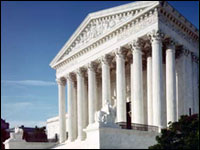
The U.S. Supreme Court decided Monday that law enforcement officials need a court-approved warrant before using a GPS device to track a suspect.
Justices offered different opinions regarding how Fourth Amendment protections against unreasonable searches and seizures apply to the balance between law enforcement and privacy.
However, the court decided unanimously on the need for a warrant. The decision was based on the case of Washington, D.C., nightclub owner Antonine Jones, who received a life sentence in 2008 on drug trafficking conspiracy charges. He had been the subject of 28 days of GPS surveillance that resulted in more than 2,000 pages of information on Jones’ whereabouts. The police had not obtained a warrant to track him via GPS. The Supreme Court voted 9-0 to toss out his life sentence.
The justices differed on how exactly warrantless GPS tracking violated the Fourth Amendment. Justice Antonin Scalia led the majority with Chief Justice John Roberts and Justices Anthony Kennedy, Clarence Thomas and Sonia Sotomayor. The use of GPS tracking devices on suspect’s cars, he said, was illegal at all times without a warrant.
The remaining four justices, led by Samuel Alito, agreed that the 28-day search in the case at hand violated expectations of privacy but added that the use of the device alone wasn’t necessarily a violation of the Fourth Amendment protection against search. The group didn’t voice an opinion on whether or not a shorter search could be allowed even without a warrant.
‘A Clear Victory’
The decision is being viewed as a victory by privacy advocates. Privacy protection groups such as the Center for Democracy and Technology, the American Civil Liberties Union, the Constitution Project and the Cato Institute had voiced their favor for the measure to protect Fourth Amendment rights.
“The court’s decision is a clear victory for privacy and for ensuring the continuing vitality of the Fourth Amendment in the digital age,” Gregory T. Nojeim, senior counsel and director of the Project on Freedom, Security & Technology at the Center for Democracy and Technology, told TechNewsWorld.
Opponents of the legislation, including the U.S. Department of Justice, argued it was their duty to keep the public safe using the tools provided, and that the protections were unpractical and overreaching. Supporters of the decision argued that they weren’t working to prevent the use of GPS tracking in necessary situations, but simply wanted to make sure the situation warranted the search.
“It’s not that law enforcement can’t use these tools, but they simply need to get a warrant,” Sharon Bradford Franklin, senior counsel with The Constitution Project, told TechNewsWorld. “We need to have safeguards in place for the people going after the bad guys to make sure it’s really the bad guys they get, and they’re not simply infringing on the rights of innocent Americans. Those tools should be available to law enforcement, and we want to make sure they’re focused on the right cases.”
The DoJ did not reply to our request for comment.
Laws Lagging?
The decision on Monday is only applicable when a law enforcement official affixes a GPS device to a suspect’s vehicle, but the use of GPS cellphone trackers is also a hot issue. With many major carriers swearing off the use of tracking programs such as Carrier IQ in the wake of consumer concerns, the question of what law enforcement can and cannot do with related technologies could be next on the legislative agenda or court docket.
“Cellphone tracking was the elephant in the room throughout the entire case. For law enforcement, cellphone location tracking is easier, cheaper, can cover more people and is less risky to law enforcement than is attaching a GPS device to a vehicle,” said Nojeim.
Justice Sonia Sotomayor voted with the majority but issued a separate statement regarding the case. In it, she mentioned that privacy expectations could be upheld even when law enforcement could access a tracking device without a physical invasion, which could include cases involving a GPS-enabled smartphone.
Nojeim estimated that the concurrences in this case could lead to five Supreme Court votes for real-time cellphone location tracking as a Fourth Amendment search, which could set the floor for upcoming legislation.





















































